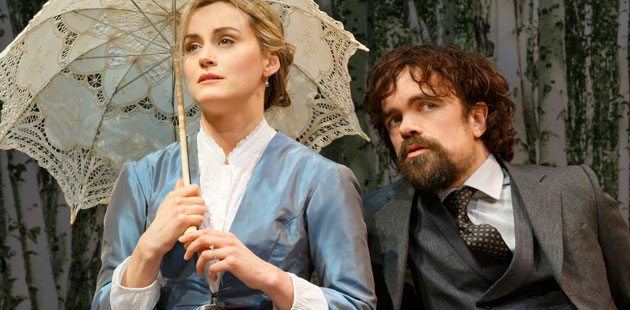
 Ivan Turgenev’s A Month in the Country is one of the most beloved comedies of manners in all of Russian theatre, and yet it seems that the current Classic Stage Company production has skipped the comedy and merely focused on the manners. Set in the country estate of the Islaev family, as the play begins we meet Natalya (Taylor Schilling) the restless lady of the house, who expresses her boredom through meaningless philosophical ramblings about the essence of love, as her close friend Rakitin (Peter Dinklage) pays close attention. Natalya seems to be left to her own devices far too often, and while her, much older, husband Arkadi (Anthony Edwards) tends to his property, she has developed a bad case of ennui. She flirts carelessly with Rakitin who is absolutely smitten with her; and even though she adores her little son Kolya (Ian Etheridge) she seems completely dissatisfied with a life as a mother and wife.
Ivan Turgenev’s A Month in the Country is one of the most beloved comedies of manners in all of Russian theatre, and yet it seems that the current Classic Stage Company production has skipped the comedy and merely focused on the manners. Set in the country estate of the Islaev family, as the play begins we meet Natalya (Taylor Schilling) the restless lady of the house, who expresses her boredom through meaningless philosophical ramblings about the essence of love, as her close friend Rakitin (Peter Dinklage) pays close attention. Natalya seems to be left to her own devices far too often, and while her, much older, husband Arkadi (Anthony Edwards) tends to his property, she has developed a bad case of ennui. She flirts carelessly with Rakitin who is absolutely smitten with her; and even though she adores her little son Kolya (Ian Etheridge) she seems completely dissatisfied with a life as a mother and wife.
Enter Kolya’s young tutor Aleksey (Mike Faist) a university student who inadvertently fills Natalya’s life with purpose and illusion, as she finds herself becoming completely infatuated with him, much to the chagrin of both Rakitin and Vera (Megan West), Natalya’s ward who suddenly finds herself becoming her rival. Passions flourish, hearts are broken and meaningful games of solitaire are played (by Arkadi’s mother beautifully played by Elizabeth Franz) as Turgenev creates a series of romantic triangles that intersect through business proposals, societal conventions and a touching “gentleman’s agreement”.
With a myriad of such fascinating characters, it’s a shame that director Erica Schmidt finds herself unable to juggle all of their larger than life personalities, her muted, reverential directorial choices making the play seem like an entry into the “white rich people with problems” series that often fails to connect with audiences. Part of this is the director seemingly surrendering her authority to allow the “bigger name” actors do whatever they want with their parts. In particular, Peter Dinklage, who does something interesting with Rakitin by heightening the tragedy of his unrequited love and eventual sacrifice, but in his intensity he’s completely humorless to the point where he can seem too antagonistic.
Edwards isn’t only underused, he often seems downright uninterested to be in the story, and while Franz, and Annabella Sciorra as the smart spinster Lizaveta, are bonafide scene stealers, their characters often seem like afterthoughts used only for comedic relief as the leads change into different costumes (lavishly designed by Tom Broecker).
There is however a reason why despite its many flaws this play is almost essential, and the reason is Taylor Schilling. Displaying a comedic gift, that surprisingly she hasn’t been allowed to expose in Orange is the New Black, she turns Natalya into a creature of destructive beauty, who has so little knowledge of herself that she thinks herself smart enough to outsmart everyone around her. Schilling glides across the stage as if dancing a waltz, unaware of the burning coals underneath her, a seductress completely unaware of the repercussions of her actions.
The beauty of her performance is that she turns Natalya, not into a femme fatale figure who deserves her eventual “punishment”, but instead into a woman trapped by the conventions of her era, a heroine who would be more at home in Sex and the City, than in the 1800s. Schilling has never looked more luminous, her smile lights up the stage, and her languorous line delivery reveals a natural gift for timing, as she seems to be the one member of the ensemble who is listening and reacting to her cast mates’ dialogues, as opposed to just reciting words on cue. It’s impossible not to fall in love with her Natalya.